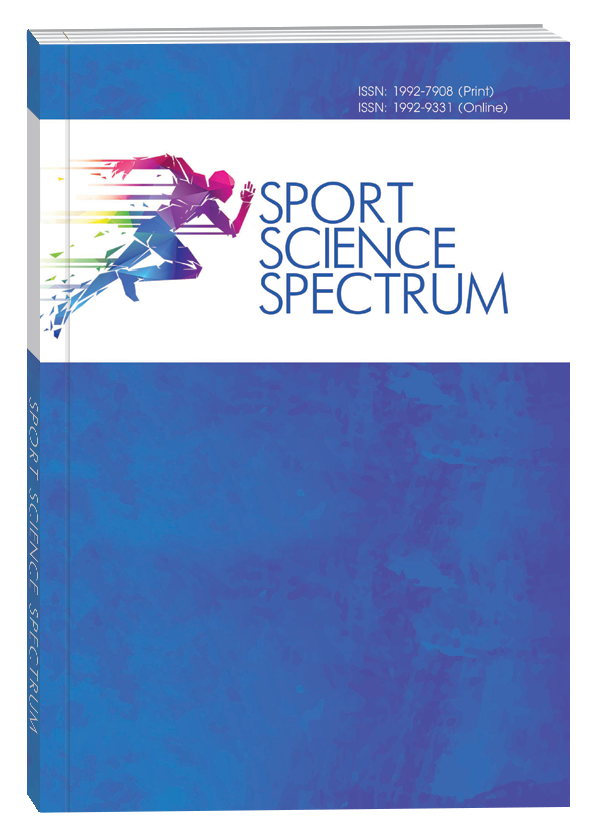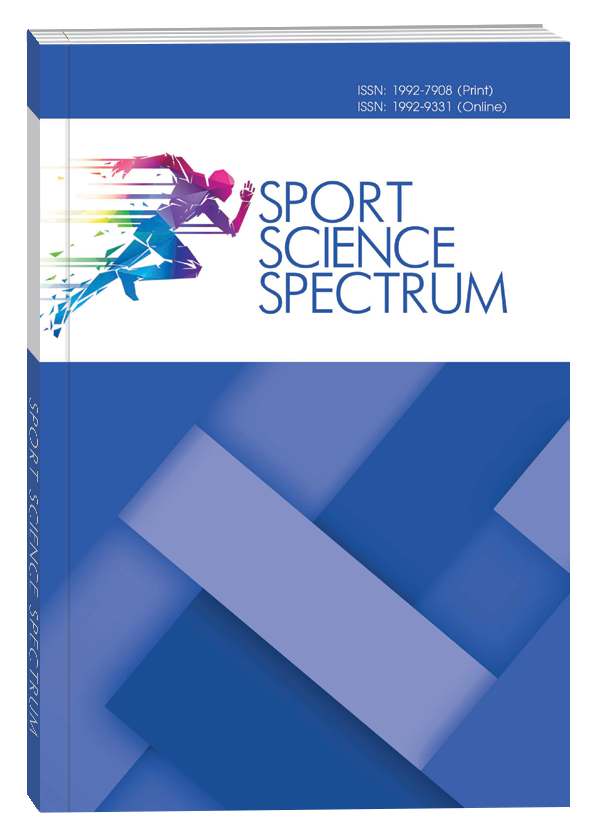ORGANIZATIONAL PRINCIPLES OF COACHES’ PROFESSIONAL TRAINING IN THE WORLD AND IN UKRAINE
DOI:
https://doi.org/10.32782/spectrum/2025-1-13Keywords:
professional development, training, coaches, organizational foundations, narrative reviewAbstract
In the context of globalization, social change, and increasing demands for the quality of sports services, the role of coaches is gaining even greater significance. Accordingly, the issues of their training and professional development constitute a relevant subject for academic inquiry.Objective: A narrative review of the organizational foundations of coach professional training worldwide and in Ukraine. Materials and Methods: analysis and systematization of data from literary sources; methods of induction and deduction, comparison and juxtaposition, methods of systematic and logical analysis, synthesis, and generalization. Results. It has been established that coaching education systems vary depending on the country and the type of sport: in some cases, training is organized by national sports organizations, while in others, it is provided by institutions of higher and continuing education. However, a hybrid model is increasingly becoming the foundation for coaches’ professional development. The coaching system is based on five key drivers, the most fundamental of which is athlete-centeredness; among the remaining four is the professional development of coaches. Within the process of professional development, three types of learning situations are distinguished: mediated (formal and non-formal), unmediated (non-formal), and internal learning (informal and self-reflection), occurring at various stages of lifelong coach education. Coach training is underpinned by various learning theories: the knowledge-based approach, the competence/expert approach, the competence-based approach, and the sociocultural approach. The most effective strategy is a combination of these approaches, selected according to context, goals, and objectives.Conclusions. The national system of coach training and professional development in Ukraine possesses certain distinctive features. Currently, the initial professional training of coaches in Ukraine is conducted as a form of mediated learning–specifically, formal education within institutions of higher education, in accordance with state standards. Among the learning theories, Ukraine has extensive experience with the knowledge-oriented approach and is progressively developing a competence-based approach. Strategically, it is envisioned that coach training and professional development in Ukraine will incorporate various forms of education–formal, non-formal, and informal. The implementation of a comprehensive system for enhancing the qualifications of Ukrainian coaches, as well as improving the overall system of their training and professional development, is gaining strategic importance for the physical culture and sports sector in Ukraine in the coming years.
References
1. Вакулова І. В. Інновації в освіті: компетентнісний підхід. Culturological almanac. 2023. № 3. С. 199–208. URL: https://doi.org/10.31392/cult. alm.2022.3.26 .
2. Василенко М. М. Теоретичні і методичні засади професійної підготовки майбутніх фітнес-тренерів у закладах вищої освіти : дис. … д-ра пед. наук : 13.00.04. Київ, 2018. 544 с. URL: https://npu.edu.ua/images/file/vidil_aspirant/dicer/D_26.053.01/dis_Vasylenko.pdf.
3. Методичні рекомендації щодо розроблення стандартів вищої освіти : Наказ МОН України від 01.06.2017 № 600. URL: https://drive.google.com/file/d/1wCmjmqZhB8PwEiQsNcQhZ9ZCfrdiJpvh/view (дата звернення: 16.01.2025).
4. Про затвердження Положення про дитячо-юнацьку спортивну школу : Постанова Каб. Міністрів України від 05.11.2008 № 993 : станом на 1 січ. 2021 р. URL: https://zakon.rada.gov.ua/laws/show/993-2008-п#Text (дата звернення: 16.01.2025).
5. Про затвердження Порядку проведення атестації тренерів (тренерів-викладачів) : Наказ М-ва молоді та спорту України від 13.01.2014 № 45 : станом на 19 квіт. 2024 р. URL: https://zakon.rada.gov.ua/laws/show/z0180-14#Text (дата звернення: 16.01.2025).
6. Про затвердження Стратегії розвитку фізичної культури і спорту на період до 2028 року : Постанова Каб. Міністрів України від 04.11.2020 № 1089 : станом на 25 серп. 2022 р. URL: https://zakon.rada.gov.ua/laws/show/1089-2020-п#Text (дата звернення: 16.01.2025).
7. Про професійний розвиток працівників : Закон України від 12.01.2012 № 4312-VI : станом на 27 груд. 2019 р. URL: https://zakon.rada.gov.ua/laws/show/4312-17#Text (дата звернення: 16.01.2025).
8. Химинець В. Компетентісний підхід до професійного розвитку вчителя. Науковий вісник Ужгородського національного університету. Серія : Педагогіка. Соціальна робота. 2010. № 19. С. 243–247. URL: http://nbuv.gov.ua/UJRN/Nvuuped_2010_18-19_75.
9. Якимчук О. Компетентнісний підхід в освіті: українські реалії. Multiversum. Philosophical almanac. 2020. Т. 2, № 2. С. 193–206. URL: https://doi.org/10.35423/2078-8142.2020.2.2.14.
10. Dohme L.-C., Rankin-Wright A. J., Lara-Bercial S. Beyond knowledge transfer: The role of coach developers as motivators for lifelong learning. International Sport Coaching Journal. 2019. Vol. 6, no. 3. P. 317–328. URL: https://doi.org/10.1123/iscj.2019-0034 (date of access: 16.01.2025).
11. Exploring football coaches’ views on coach education, role, and practice design: An Australian perspective / E. Selimi et al. PLOS ONE. 2023. Vol. 18, no. 5. P. e0285871. URL: https://doi.org/10.1371/journal.pone.0285871 (date of access: 01.02.2025).
12. Gearity B., Callary B. Coach Education and Development in Sport: Instructional Strategies. Taylor & Francis Group, 2019.
13. ICCE standards for higher education sport coaching bachelor degrees, version 2.0. Official edition. 2023. 26 p. URL: https://icce.ws/wp-content/uploads/2024/11/ICDS-Standards-for-Higher-Education-Final.pdf.
14. International council for coaching excellence position statement “professionalisation of sport coaching as a global process of continuous improvement” / S. Lara-Bercial et al. International sport coaching journal. 2022. P. 1–4. URL: https://doi.org/10.1123/iscj.2021-0097.
15. International Council International Council for Coaching Excellence, Association of Association of Summer Olympic International Federations, Leeds Beckett Leeds Beckett University. European sport coaching framework. Human Kinetics, 2013. 56 p. URL: https://www.coachlearn.eu/_assets/files/project_documents/european-sport-coaching-framework.pdf.
16. International sport coaching framework / ed. by Association of Summer Olympic International Federations, L. M. University. Champaign, Illinois : Human Kinetics, 2013. 55 p. URL: https://icce.ws/wp-content/uploads/2023/01/ISCF_1_aug_2012.pdf.
17. Learning to coach: An ecological dynamics perspective / M. A. Wood et al. International Journal of Sports Science & Coaching. 2022. P. 174795412211386. URL: https://doi.org/10.1177/17479541221138680 (date of access: 01.02.2025).
18. Moon J. A. A handbook of reflective and experiential learning. Routledge Taylor & Francis Group, 2013. 258 p. URL: https://doi.org/10.4324/9780203416150.
19. Moustakas L., Petry K., Lara-Bercial S. Mapping sport coaching policy in Europe: Research report. Cologne : Institute of European Sport Development and Leisure Studies, 2020. 24 p. URL: https://www.peak-coachingeu.com/wp-content/uploads/2021/03/PEAK_ResearchReport.pdf.
20. Trudel P., Culver D., Werthner P. Looking at coach development from the coach-learner’s perspective. Routledge handbook of sports coaching. 2013. URL: https://doi.org/10.4324/9780203132623.ch30 (date of access: 16.01.2025).





